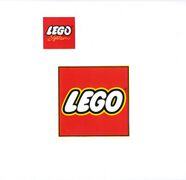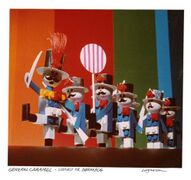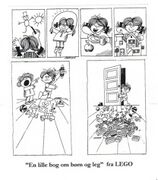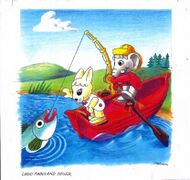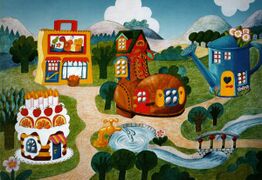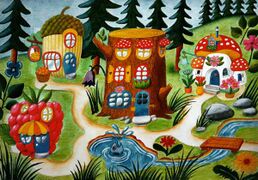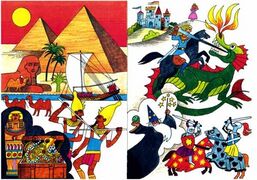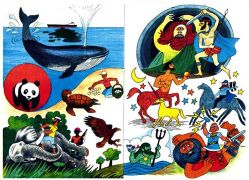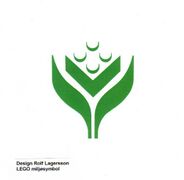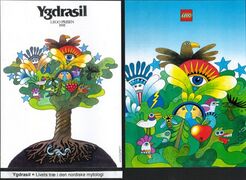Rolf Lagersson: Difference between revisions
No edit summary |
No edit summary |
||
| Line 19: | Line 19: | ||
== Biography == | == Biography == | ||
=== | === Sweden === | ||
Rolf Lagerson was born on 8 January 1925 in [[Wikipedia:Malmö|Malmö]], [[Wikipedia:Skåne|Skåne]].<ref name="Amstutz"/> He was the second of three children of Ernst Ragnar Lagersson, an [[Wikipedia:Electrical engineering|electrical engineer]], and Ellen Birgitta "Britta" Strömberg.<ref name="Vem Skane 1948"/><ref name="uppslag 2-13"/><ref name="grave EBL"/> He initially studied architecture in 1944, but decided against it and quit to work with a [[Wikipedia:Printer (publishing)|printer]] before later choosing a career in [[Wikipedia:Graphic arts|graphic art]]. From 1946–1948 he studied in [[Wikipedia:Stockholm|Stockholm]] at {{ill|Anders Beckman's|sv|Anders Beckman (konstnär)}} {{ill|school of advertising art|sv|Beckmans designhögskola}}{{efn|{{lang-sv|Anders Beckmans Reklamskola}}, renamed to Beckman College of Design ({{lang-sv|Beckmans Designhögskola}}) in 2003.<ref name="Beckmans"/>}} and the SGF school of typographical design.<ref name="Amstutz"/><ref name="Vem ar det 1967"/> | Rolf Lagerson was born on 8 January 1925 in [[Wikipedia:Malmö|Malmö]], [[Wikipedia:Skåne|Skåne]].<ref name="Amstutz"/> He was the second of three children of Ernst Ragnar Lagersson, an [[Wikipedia:Electrical engineering|electrical engineer]], and Ellen Birgitta "Britta" Strömberg.<ref name="Vem Skane 1948"/><ref name="uppslag 2-13"/><ref name="grave EBL"/> He initially studied architecture in 1944, but decided against it and quit to work with a [[Wikipedia:Printer (publishing)|printer]] before later choosing a career in [[Wikipedia:Graphic arts|graphic art]]. From 1946–1948 he studied in [[Wikipedia:Stockholm|Stockholm]] at {{ill|Anders Beckman's|sv|Anders Beckman (konstnär)}} {{ill|school of advertising art|sv|Beckmans designhögskola}}{{efn|{{lang-sv|Anders Beckmans Reklamskola}}, renamed to Beckman College of Design ({{lang-sv|Beckmans Designhögskola}}) in 2003.<ref name="Beckmans"/>}} and the SGF school of typographical design.<ref name="Amstutz"/><ref name="Vem ar det 1967"/> | ||
For the following six years he worked at several advertising agencies: {{ill|Gumælius Annonsbyrå|sv|Gumaelius (reklambyrå)}} in Stockholm from 1948–1950, [[Wikipedia:Benton & Bowles|Benton & Bowles]] in [[Wikipedia:New York City|New York]] during 1951, and Wilh. Anderssons Annonsbyrå in Stockholm from 1951–1955.<ref name="Vem ar det 1967"/><ref name="Foreign Advertising"/> He also worked at a design agency in Chicago.<ref name="Rolf about"/> In 1954 he began working as a [[Wikipedia:Freelancer|freelance]] artist, operating his own studio in Stockholm from 1955–1965.<ref name="Amstutz"/><ref name="Vem ar det 1967"/> During this decade, Lagerson acted as a consultant art director and designer for various advertising agencies, industrial companies, and publishing houses, as well as Sweden's [[Wikipedia:Ministry of Finance (Sweden)|Ministry of Finance]], [[Wikipedia:Ministry of the Interior (Sweden)|Ministry of Home Affairs]], and {{ill|Board of Education|sv|Skolöverstyrelsen}}.<ref name="Amstutz"/> Additionally, Lagerson became a founding member of the Swedish Poster Design Association (SAFFT){{efn|{{lang-sv|Svenska Affischtecknare}},<ref name="Aynsley"/> later ABCD.<ref name="Gyllenhoff"/>}} in 1949, a member of its board in 1954, and the society's president from 1957–1959.<ref name="Amstutz"/><ref name="Gyllenhoff"/> | For the following six years he worked at several advertising agencies: {{ill|Gumælius Annonsbyrå|sv|Gumaelius (reklambyrå)}} in Stockholm from 1948–1950, [[Wikipedia:Benton & Bowles|Benton & Bowles]] in [[Wikipedia:New York City|New York]] during 1951, and Wilh. Anderssons Annonsbyrå in Stockholm from 1951–1955.<ref name="Vem ar det 1967"/><ref name="Foreign Advertising"/> He also worked at a design agency in Chicago.<ref name="Rolf about"/> In 1954 he began working as a [[Wikipedia:Freelancer|freelance]] artist, operating his own studio in Stockholm from 1955–1965.<ref name="Amstutz"/><ref name="Vem ar det 1967"/> During this decade, Lagerson acted as a consultant art director and designer for various advertising agencies, industrial companies, and publishing houses, as well as Sweden's [[Wikipedia:Ministry of Finance (Sweden)|Ministry of Finance]], [[Wikipedia:Ministry of the Interior (Sweden)|Ministry of Home Affairs]], and {{ill|Board of Education|sv|Skolöverstyrelsen}}.<ref name="Amstutz"/> Additionally, Lagerson became a founding member of the Swedish Poster Design Association (SAFFT){{efn|{{lang-sv|Svenska Affischtecknare}},<ref name="Aynsley"/> later ABCD.<ref name="Gyllenhoff"/>}} in 1949, a member of its board in 1954, and the society's president from 1957–1959.<ref name="Amstutz"/><ref name="Gyllenhoff"/> | ||
Lagerson married Birgitta "Gitt" Hammarberg, a freelance artist and textile designer who had studied fashion at Beckman's school during the time Rolf was also a student there.<ref name="Come to Sweden"/><ref name="Brismo"/> The two had a daughter together, Lotta.<ref name="Tryckt till Jul"/> In 1965 Gitt and Rolf separated. Rolf moved to Denmark, where he later remarried.<ref name="Come to Sweden"/> | Lagerson married Birgitta "Gitt" Hammarberg, a freelance artist and textile designer who had studied fashion at Beckman's school during the time Rolf was also a student there.<ref name="Come to Sweden"/><ref name="Brismo"/> The two had a daughter together, Lotta.<ref name="Tryckt till Jul"/> In 1965 Gitt and Rolf separated. Rolf moved to Denmark, where he later remarried.<ref name="Come to Sweden"/> | ||
=== | === Denmark === | ||
During 1966 Lagersson worked at the [[Wikipedia:Copenhagen|Copenhagen]] branch of the {{ill|Swedish Telegram Agency|sv|Svenska Telegrambyrån|fr|Agence Svenska Telegrambyran}}. In 1967 he began working with [[Niels Hartmann]], a Danish graphic designer who had become a member of [[Wikipedia:Alliance Graphique Internationale|Alliance Graphique Internationale]] that year.<ref name="Vem ar det 1995"/><ref name="AGI Niels"/> In 1968 Lagersson once again started operating his own studio, now based in [[Wikipedia:Hørsholm|Hørsholm]], north of Copenhagen<ref name="Danske selskaber"/> From 1970–1974 Lagersson worked as the creative director at [[Dot Zero|Dot Zero Design Group]], a studio co-owned by [[the LEGO Group]].<ref name="DLPS Lego"/><ref name="Vem ar det 2001"/> Lagersson moved to Plan Design in 1974 and Papermint Design in 1976, but continued working with the LEGO Group into the 1990s. | In Denmark, Rolf started spelling his last name ''Lagersson'', the spelling that his father Ragnar had used. During 1966 Lagersson worked at the [[Wikipedia:Copenhagen|Copenhagen]] branch of the {{ill|Swedish Telegram Agency|sv|Svenska Telegrambyrån|fr|Agence Svenska Telegrambyran}}. In 1967 he began working with [[Niels Hartmann]], a Danish graphic designer who had become a member of [[Wikipedia:Alliance Graphique Internationale|Alliance Graphique Internationale]] that year.<ref name="Vem ar det 1995"/><ref name="AGI Niels"/> In 1968 Lagersson once again started operating his own studio, now based in [[Wikipedia:Hørsholm|Hørsholm]], north of Copenhagen<ref name="Danske selskaber"/> From 1970–1974 Lagersson worked as the creative director at [[Dot Zero|Dot Zero Design Group]], a studio co-owned by [[the LEGO Group]].<ref name="DLPS Lego"/><ref name="Vem ar det 2001"/> Lagersson moved to Plan Design in 1974 and Papermint Design in 1976, but continued working with the LEGO Group into the 1990s. | ||
In his later years, Lagersson suffered from complications caused by [[Wikipedia:Asthma|asthma]].<ref name="Gyllenhoff"/> He ceased operating his personal studio in 2003.<ref name="Danske selskaber"/> Lagersson died on 9 January 2006, one day after his 81st birthday.<ref name="Rolf about"/> | In his later years, Lagersson suffered from complications caused by [[Wikipedia:Asthma|asthma]].<ref name="Gyllenhoff"/> He ceased operating his personal studio in 2003.<ref name="Danske selskaber"/> Lagersson died on 9 January 2006, one day after his 81st birthday.<ref name="Rolf about"/> | ||
== Works == | == Works == | ||
Rolf Lagersson designed around 300 cover illustrations for books published in Sweden and Denmark.<ref name="Rolf about"/> (figure out which ones are notable enough to list) He also created the cover art for the [[Wikipedia:Translation of The Lord of the Rings into Swedish| | Rolf Lagersson designed around 300 cover illustrations for books published in Sweden and Denmark.<ref name="Rolf about"/> (figure out which ones are notable enough to list) He also created the cover art for the original 1959–1961 [[Wikipedia:Translation of The Lord of the Rings into Swedish|Swedish translations]] of ''[[Wikipedia:The Lord of the Rings|The Lord of the Rings]]'', using stylised illustrations inspired by Greek paintings.<ref name="Sundmark"/><ref name="Rolf book covers 2"/> As well as criticising [[Wikipedia:Åke Ohlmarks|Åke Ohlmarks's]] Swedish translation, author [[Wikipedia:J. R. R. Tolkien|J. R. R. Tolkien]] disapproved of Lagerson's cover for ''[[Wikipedia:The Fellowship of the Ring|The Fellowship of the Ring]]'', claiming it had nothing to do with the story and describing it as depicting "pink nudes [which] appear to be fighting some blue nudes of similar shape".<ref name="Tolkien"/> | ||
Lagerson's work was exhibited in Oslo in 1957, at the Internordic Association of Commercial Artists's (NT) exhibition of advertising art in Stockholm and at the Royal Ontario Museum in Toronto in 1959, and at the Swedish Design Exhibition in Tokyo in 1960.<ref name="Amstutz"/> Three works he designed for books are represented at the [[Wikipedia:Nationalmuseum|Nationalmuseum]].<ref name="Rolf about"/><ref name="nationalmuseum"/> Lagerson won awards in several Swedish competitions between 1949–1958, and won first prize for Internordic Association of Commercial Artists contests in 1956, 1957, and 1959.<ref name="Amstutz"/> In 1980 he was awarded the {{ill|IG Prize|da|IG Prisen}} for a logo designed for the {{ill|Danish Cancer Society|da|Kræftens Bekæmpelse}}.<ref name="Bernsen"/><ref name="Dickson"/> | Lagerson's work was exhibited in Oslo in 1957, at the Internordic Association of Commercial Artists's (NT) exhibition of advertising art in Stockholm and at the Royal Ontario Museum in Toronto in 1959, and at the Swedish Design Exhibition in Tokyo in 1960.<ref name="Amstutz"/> Three works he designed for books are represented at the [[Wikipedia:Nationalmuseum|Nationalmuseum]].<ref name="Rolf about"/><ref name="nationalmuseum"/> Lagerson won awards in several Swedish competitions between 1949–1958, and won first prize for Internordic Association of Commercial Artists contests in 1956, 1957, and 1959.<ref name="Amstutz"/> In 1980 he was awarded the {{ill|IG Prize|da|IG Prisen}} for a logo designed for the {{ill|Danish Cancer Society|da|Kræftens Bekæmpelse}}.<ref name="Bernsen"/><ref name="Dickson"/> | ||
| Line 38: | Line 38: | ||
Lagerson began creating paper sculptures in 1951, studying from {{ill|Tadeusz Lipski's|pl|Tadeusz Lipski (grafik)}} 1947 book [https://archive.org/details/papersculpture0000tade ''Paper Sculpture'']. He later started designing paper dolls that could stand on their own, inspired by the [[Wikipedia:Stop motion|stop motion]] films of Czech animator [[Wikipedia:Jiří Trnka|Jiří Trnka]].<ref name="Angrave"/> Lagerson's dolls had [[Wikipedia:Ping-pong ball|ping-pong balls]] for heads, [[Wikipedia:Conical|conical]] paper bodies, and flat paper limbs. The dolls were customised with various paper details to create faces, uniforms, and headwear, and placed in sets also made of paper. The full sculptures were intended for use in colour photography. In his 1957 book ''Sculpture in Paper'', [[Wikipedia:Bruce Angrave|Bruce Angrave]] compared Lagerson's paper doll art to the works of [[Wikipedia:Walter Trier|Walter Trier]], "with the added excitement of a three-dimensional over-tone".<ref name="Angrave"/> | Lagerson began creating paper sculptures in 1951, studying from {{ill|Tadeusz Lipski's|pl|Tadeusz Lipski (grafik)}} 1947 book [https://archive.org/details/papersculpture0000tade ''Paper Sculpture'']. He later started designing paper dolls that could stand on their own, inspired by the [[Wikipedia:Stop motion|stop motion]] films of Czech animator [[Wikipedia:Jiří Trnka|Jiří Trnka]].<ref name="Angrave"/> Lagerson's dolls had [[Wikipedia:Ping-pong ball|ping-pong balls]] for heads, [[Wikipedia:Conical|conical]] paper bodies, and flat paper limbs. The dolls were customised with various paper details to create faces, uniforms, and headwear, and placed in sets also made of paper. The full sculptures were intended for use in colour photography. In his 1957 book ''Sculpture in Paper'', [[Wikipedia:Bruce Angrave|Bruce Angrave]] compared Lagerson's paper doll art to the works of [[Wikipedia:Walter Trier|Walter Trier]], "with the added excitement of a three-dimensional over-tone".<ref name="Angrave"/> | ||
In 1972 Lagersson | In 1972 Lagersson redesigned the LEGO logo for the LEGO Group.<ref name="Rolf logos"/><ref name="DLPS Lego"/> The new logo was intended to replace the various previous logos to unify the brand during a time when the LEGO Group was expanding internationally.<ref name=Evamy/> The new design was based on the previous 1964 LEGO logo, but simplified to only feature the company's name, written in bubble-styled lettering contoured with black and yellow.<ref name=Evamy/><ref name="Lego history"/> Hartmann intended for the logo to be simple and modular enough that it could be applied anywhere.<ref name="AGI Niels"/> The new logo was publicly used starting in 1973, eventually receiving a minor redesign in 1998.<ref name=Evamy/> | ||
== Select works == | == Select works == | ||
| Line 99: | Line 99: | ||
<ref name="Rolf logos">{{cite web |url=http://www.sve-dan.dk/midten7.htm |title=Logos - Symboler |website=Rolf Lagersson Billedmager |archive-url=https://web.archive.org/web/20240126173107/http://www.sve-dan.dk/midten7.htm |archive-date=26 January 2024 |url-status=live |language=da |access-date=5 August 2024}}</ref> | <ref name="Rolf logos">{{cite web |url=http://www.sve-dan.dk/midten7.htm |title=Logos - Symboler |website=Rolf Lagersson Billedmager |archive-url=https://web.archive.org/web/20240126173107/http://www.sve-dan.dk/midten7.htm |archive-date=26 January 2024 |url-status=live |language=da |access-date=5 August 2024}}</ref> | ||
<ref name="Sundmark">{{cite book |url=https://books.google.com/books?id=TU8AEAAAQBAJ&pg=PA124&hl=en&newbks=1&newbks_redir=0&sa=X&ved=2ahUKEwienpOc8OKHAxXimO4BHd38LdMQ6AF6BAgEEAI#v=onepage&q&f=false |title=Translating and Transmediating Children's Literature |editor-first=Björn |editor-last=Sundmark |publisher=[[Wikipedia:Springer Nature|Springer Nature Switzerland AG]] |location=[[Wikipedia:Cham, Switzerland|Cham, Switzerland]] |isbn=978-3-030-52527-9 |page=124 |chapter=The Translation and Visualization of Tolkien's ''The Hobbit'' into Swedish, the Aesthetics of Fantasy, and Tove Jansson's Illustrations |quote=The Swedish covers by Rolf Lagerson, both the ones for the first edition 1959–1961 and for the 1967 paperback edition, also work as crossover-illustrations; they represent identifiable scenes and actions from the book, yet they do so in a non-realistic and highly stylized form. The first three (1959–1961) draw inspiration from Greek designs and paintings, while the 1967-set is less stylistically determined.}}</ref> | |||
<ref name="Tolkien">{{cite book |url=https://archive.org/details/isbn_9780618391011/page/419/mode/2up?view=theater |title=The J.R.R. Tolkien Companion and Guide – Reader's Guide |first1=Christina |last1=Scull |first2=Wayne G. |last2=Hammond |year=2006 |publisher=[[Wikipedia:Houghton Mifflin Company|Houghton Mifflin Company]] |location=[[Wikipedia:New York City|New York]] |isbn=978-0-618-39101-1 |page=419 |quote=He was no happier with the cover art of the Swedish Fellowship of the Ring (1959): in a draft letter on 14 January 1961, probably to Alina Dadlez, he described it as containing 'pink nudes [which] appear to be fighting some blue nudes of similar shape (in black bathing costumes). Three of the pink nudes are riding horses and have spears; those on foot have axes. Two of the blue men are on oxen; the blues have swords or bows. To what people or incidents in the Tale at any point can this have any conceivable reference?'}}</ref> | <ref name="Tolkien">{{cite book |url=https://archive.org/details/isbn_9780618391011/page/419/mode/2up?view=theater |title=The J.R.R. Tolkien Companion and Guide – Reader's Guide |first1=Christina |last1=Scull |first2=Wayne G. |last2=Hammond |year=2006 |publisher=[[Wikipedia:Houghton Mifflin Company|Houghton Mifflin Company]] |location=[[Wikipedia:New York City|New York]] |isbn=978-0-618-39101-1 |page=419 |quote=He was no happier with the cover art of the Swedish Fellowship of the Ring (1959): in a draft letter on 14 January 1961, probably to Alina Dadlez, he described it as containing 'pink nudes [which] appear to be fighting some blue nudes of similar shape (in black bathing costumes). Three of the pink nudes are riding horses and have spears; those on foot have axes. Two of the blue men are on oxen; the blues have swords or bows. To what people or incidents in the Tale at any point can this have any conceivable reference?'}}</ref> | ||
Revision as of 23:46, 7 August 2024
Rolf Lagersson | |
|---|---|
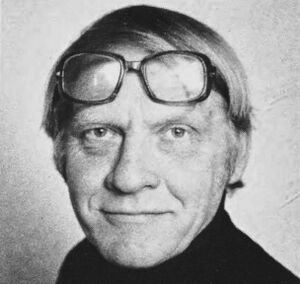 Lagersson in 1988 | |
| Born | Rolf Harald Lagerson 8 January 1925 |
| Died | 9 January 2006 (aged 81) |
| Education | Anders Beckmans Reklamskola |
| Occupations |
|
| Years active | 1948–2003 |
Rolf Harald Lagersson (also spelled Lagerson;[a] 8 January 1925 – 9 January 2006) was a Swedish artist and graphic designer. He was a student of Anders Beckman, and became a well-known figure in Swedish advertising in the 1950s. After living in Sweden for around 40 years, Lagersson moves to Denmark in 1965 and spent another 40 years there. For 27 years he worked with the LEGO Group as a designer, creating logos, packaging, catalogue art, and book illustrations. He illustrated hundreds of covers for Swedish and Danish books, winning multiple awards for his works. Some of his most well-known works from Denmark include the logos for LEGO and the Danish Cancer Society, the latter of which won him the IG Prize in 1980.
Biography
Sweden
Rolf Lagerson was born on 8 January 1925 in Malmö, Skåne.[1] He was the second of three children of Ernst Ragnar Lagersson, an electrical engineer, and Ellen Birgitta "Britta" Strömberg.[2][3][4] He initially studied architecture in 1944, but decided against it and quit to work with a printer before later choosing a career in graphic art. From 1946–1948 he studied in Stockholm at Anders Beckman's school of advertising art[b] and the SGF school of typographical design.[1][6]
For the following six years he worked at several advertising agencies: Gumælius Annonsbyrå in Stockholm from 1948–1950, Benton & Bowles in New York during 1951, and Wilh. Anderssons Annonsbyrå in Stockholm from 1951–1955.[6][7] He also worked at a design agency in Chicago.[8] In 1954 he began working as a freelance artist, operating his own studio in Stockholm from 1955–1965.[1][6] During this decade, Lagerson acted as a consultant art director and designer for various advertising agencies, industrial companies, and publishing houses, as well as Sweden's Ministry of Finance, Ministry of Home Affairs, and Board of Education.[1] Additionally, Lagerson became a founding member of the Swedish Poster Design Association (SAFFT)[c] in 1949, a member of its board in 1954, and the society's president from 1957–1959.[1][10]
Lagerson married Birgitta "Gitt" Hammarberg, a freelance artist and textile designer who had studied fashion at Beckman's school during the time Rolf was also a student there.[11][12] The two had a daughter together, Lotta.[13] In 1965 Gitt and Rolf separated. Rolf moved to Denmark, where he later remarried.[11]
Denmark
In Denmark, Rolf started spelling his last name Lagersson, the spelling that his father Ragnar had used. During 1966 Lagersson worked at the Copenhagen branch of the Swedish Telegram Agency. In 1967 he began working with Niels Hartmann, a Danish graphic designer who had become a member of Alliance Graphique Internationale that year.[14][15] In 1968 Lagersson once again started operating his own studio, now based in Hørsholm, north of Copenhagen[16] From 1970–1974 Lagersson worked as the creative director at Dot Zero Design Group, a studio co-owned by the LEGO Group.[17][18] Lagersson moved to Plan Design in 1974 and Papermint Design in 1976, but continued working with the LEGO Group into the 1990s.
In his later years, Lagersson suffered from complications caused by asthma.[10] He ceased operating his personal studio in 2003.[16] Lagersson died on 9 January 2006, one day after his 81st birthday.[8]
Works
Rolf Lagersson designed around 300 cover illustrations for books published in Sweden and Denmark.[8] (figure out which ones are notable enough to list) He also created the cover art for the original 1959–1961 Swedish translations of The Lord of the Rings, using stylised illustrations inspired by Greek paintings.[19][20] As well as criticising Åke Ohlmarks's Swedish translation, author J. R. R. Tolkien disapproved of Lagerson's cover for The Fellowship of the Ring, claiming it had nothing to do with the story and describing it as depicting "pink nudes [which] appear to be fighting some blue nudes of similar shape".[21]
Lagerson's work was exhibited in Oslo in 1957, at the Internordic Association of Commercial Artists's (NT) exhibition of advertising art in Stockholm and at the Royal Ontario Museum in Toronto in 1959, and at the Swedish Design Exhibition in Tokyo in 1960.[1] Three works he designed for books are represented at the Nationalmuseum.[8][22] Lagerson won awards in several Swedish competitions between 1949–1958, and won first prize for Internordic Association of Commercial Artists contests in 1956, 1957, and 1959.[1] In 1980 he was awarded the IG Prize for a logo designed for the Danish Cancer Society.[23][24]
Lagerson began creating paper sculptures in 1951, studying from Tadeusz Lipski's 1947 book Paper Sculpture. He later started designing paper dolls that could stand on their own, inspired by the stop motion films of Czech animator Jiří Trnka.[25] Lagerson's dolls had ping-pong balls for heads, conical paper bodies, and flat paper limbs. The dolls were customised with various paper details to create faces, uniforms, and headwear, and placed in sets also made of paper. The full sculptures were intended for use in colour photography. In his 1957 book Sculpture in Paper, Bruce Angrave compared Lagerson's paper doll art to the works of Walter Trier, "with the added excitement of a three-dimensional over-tone".[25]
In 1972 Lagersson redesigned the LEGO logo for the LEGO Group.[26][17] The new logo was intended to replace the various previous logos to unify the brand during a time when the LEGO Group was expanding internationally.[27] The new design was based on the previous 1964 LEGO logo, but simplified to only feature the company's name, written in bubble-styled lettering contoured with black and yellow.[27][28] Hartmann intended for the logo to be simple and modular enough that it could be applied anywhere.[15] The new logo was publicly used starting in 1973, eventually receiving a minor redesign in 1998.[27]
Select works
-
LEGO logo, 1972
-
"General Caramel", 1975
-
"En lille bog om børn og leg", 1980
-
Fabuland illustration, 1983
-
Duplo theme concept art, 1988
-
Duplo theme concept art, 1988
-
LEGO theme concept art, 1989
-
LEGO theme concept art, 1989
-
LEGO environmental symbol, 1995
-
Ygdrasil, 1995
-
LEGO packaging, 1971–1997
Notes
- ↑ Although other members of his family used the spelling "Lagersson", Rolf's name was initially spelled "Lagerson". After moving to Denmark in 1965 he began using Lagersson instead. In Swedish sources he remains better known as Lagerson.
- ↑ Template:Lang-sv, renamed to Beckman College of Design (Template:Lang-sv) in 2003.[5]
- ↑ Template:Lang-sv,[9] later ABCD.[10]
References
- ↑ a b c d e f g Amstutz, Walter, ed. (1962). Who's Who in Graphic Art. Zurich: Amstutz & Herdeg Graphis Press. p. 433.
- ↑ Harness, Paul, ed. (1948). "Lagersson, Ernst Ragnar". Vem är Vem? – Skånedelen [Who is Who? Skåne region] (in Swedish). Stockholm: J. O. Peterson. p. 304. Archived from the original on 3 August 2024 – via Project Runeberg.
- ↑ "Avdelningsredaktörer". Svensk uppslagsbok [Swedish reference book] (in Swedish). Vol. 13 (2nd ed.). Malmö: Förlagshuset Norden. 1949. p. vi. Archived from the original on 4 August 2024 – via Project Runeberg.
- ↑ "Ellen Birgitta Lagersson (1897–1984)". Find a Grave. Archived from the original on 2024-08-04. Retrieved 2024-08-04.
- ↑ "Then and now". Beckmans. Archived from the original on 6 May 2024. Retrieved 2 August 2024.
- ↑ a b c Lagerström, Sten, ed. (1966). "Lagerson, Rolf H". Vem är det: svensk biografisk handbok [Who is it: Swedish biographical handbook] (in Swedish) (1967 ed.). Stockholm: Norstedt & Söner. p. 510. Archived from the original on 3 August 2024 – via Project Runeberg.
- ↑ A Directory of Foreign Advertising Agencies and Marketing Research Organizations. Washington, D.C.: U.S. Government Printing Office. April 1959. p. 109. OCLC 1155970.
- ↑ a b c d "About Rolf Lagersson". Rolf Lagersson Billedmager (in Danish). Archived from the original on 26 January 2024. Retrieved 31 July 2024.
- ↑ Aynsley, Jeremy. "A Century of Graphic Design". London: Mitchell Beazley. p. 128. ISBN 1-84000-348-0.
- ↑ a b c Gyllenhoff, Carl (21 January 2006). "Rolf Lagerson". Dagens Nyheter. Stockholm. Off-site copy available here.
- ↑ a b Vagland, Jens; Tjelder, Michael; Londen, Magnus (2015). "Rolf Lagerson". Come to Sweden (in Swedish). Come to Sweden Publishing AB. ISBN 978-91-637-8312-8. Archived from the original on 26 January 2024.
- ↑ Brismo, Karin (1 December 2019). "Juliana i vart hus - Gitt Lindberg Lagerson". designbyBrismo (in Swedish). Archived from the original on 5 August 2024.
- ↑ Lindqvist, Anna; Widmark, Marie Odenbring (25 September 2016). "Rolf Lagerson". Tryckt till Jul [Printed for Christmas] (in Swedish). Archived from the original on 31 July 2024.
- ↑ Uddling, Hans; Paabo, Katrin, eds. (1994). "Lagersson, Rolf H". Vem är det: Svensk biografisk handbok [Who is it: Swedish biographical handbook] (in Swedish) (1995 ed.). Stockholm: Norstedts förlag. p. 628. ISBN 91-1-943202-X. ISSN 0347-3341. Archived from the original on 5 August 2024 – via Project Runeberg.
- ↑ a b "Niels Hartmann, Denmark (1967)". Alliance Graphique Internationale. Archived from the original on 31 July 2024.
- ↑ a b "Rolf Lagersson". Danske selskaber [Danish companies] (in Danish). Archived from the original on 2024-07-31.
- ↑ a b "LEGO". Danish Logo Preservation Society. December 2017. Archived from the original on 2018-02-21.
- ↑ Jönsson, Lena, ed. (1994). "Lagersson, Rolf H". Vem är det: Svensk biografisk handbok [Who is it: Swedish biographical handbook] (in Swedish) (2001 ed.). Stockholm: Norstedt & Söner. p. 650. ISBN 91-7285-042-6. ISSN 0347-3341. Archived from the original on 3 August 2024 – via Project Runeberg.
- ↑ Sundmark, Björn (ed.). "The Translation and Visualization of Tolkien's The Hobbit into Swedish, the Aesthetics of Fantasy, and Tove Jansson's Illustrations". Translating and Transmediating Children's Literature. Cham, Switzerland: Springer Nature Switzerland AG. p. 124. ISBN 978-3-030-52527-9.
The Swedish covers by Rolf Lagerson, both the ones for the first edition 1959–1961 and for the 1967 paperback edition, also work as crossover-illustrations; they represent identifiable scenes and actions from the book, yet they do so in a non-realistic and highly stylized form. The first three (1959–1961) draw inspiration from Greek designs and paintings, while the 1967-set is less stylistically determined.
- ↑ "Bogomslag 2". Rolf Lagersson Billedmager (in Danish). Archived from the original on 26 January 2024. Retrieved 31 July 2024.
- ↑ Scull, Christina; Hammond, Wayne G. (2006). The J.R.R. Tolkien Companion and Guide – Reader's Guide. New York: Houghton Mifflin Company. p. 419. ISBN 978-0-618-39101-1.
He was no happier with the cover art of the Swedish Fellowship of the Ring (1959): in a draft letter on 14 January 1961, probably to Alina Dadlez, he described it as containing 'pink nudes [which] appear to be fighting some blue nudes of similar shape (in black bathing costumes). Three of the pink nudes are riding horses and have spears; those on foot have axes. Two of the blue men are on oxen; the blues have swords or bows. To what people or incidents in the Tale at any point can this have any conceivable reference?'
- ↑ "Rolf Lagerson". Nationalmuseum. Archived from the original on 4 August 2024.
- ↑ Bernsen, Jens; Capetillo, Birgitta, eds. (1988). Profession: Designer. Copenhagen: Dansk Design Center. pp. 90–91. ISBN 87-87385-40-6.
- ↑ Dickson, Thomas (2006). "Grafisk design". Dansk design. Copenhagen: Gyldendal. p. 476. ISBN 978-87-02-07768-1.
Sløjfens facon gav i midten af 1970'eme inspiration til det logo, som Kræftens Bekæmpelse har i dag. Det blev tegnet af grafikeren Rolf Lagersson og tegnestuen Plan Design, der forenklede det gamle mærke til et mere abstrakt symbol for foreningen.
- ↑ a b Angrave, Bruce (1957). Sculpture in Paper. London: The Studio Ltd. pp. 86–87.
- ↑ "Logos - Symboler". Rolf Lagersson Billedmager (in Danish). Archived from the original on 26 January 2024. Retrieved 5 August 2024.
- ↑ a b c Evamy, Michael (2007). Logo (2015 ed.). London: Laurence King Publishing. pp. 152–153. ISBN 978-1-78067-180-2.
- ↑ "A modern, international company – LEGO History". LEGO.com. Archived from the original on 31 July 2024. Retrieved 5 August 2024.
External links
- Official website (requires flash)
- Rolf Lagerson at Swedish Wikipedia
